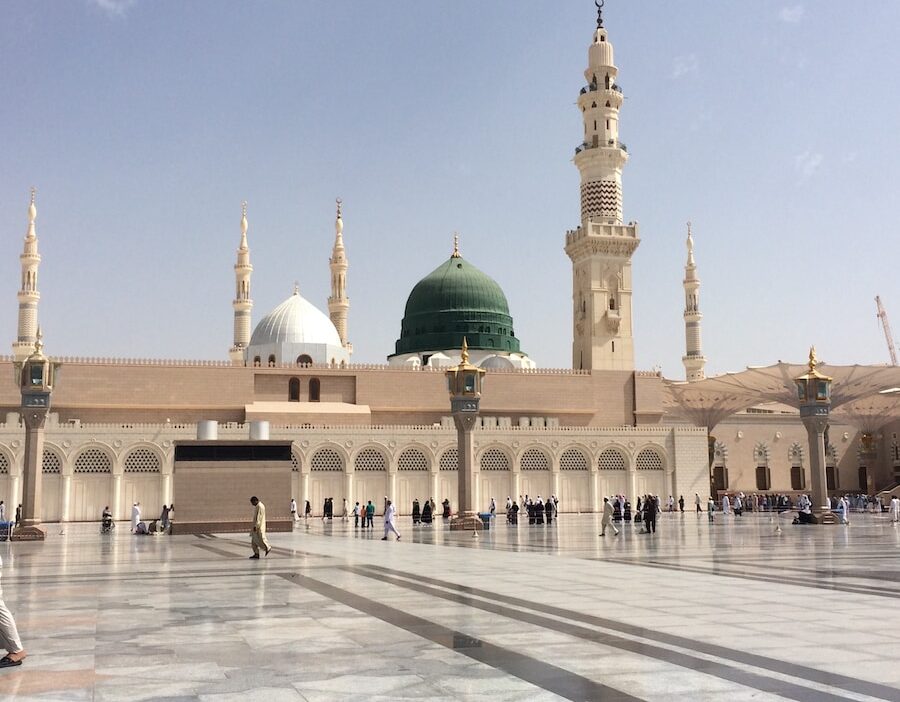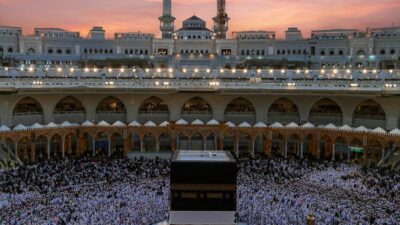Introduction
In part one we examined the early life of ‘Umar al-Khattab, his islam, and his migration. Part two of this series highlights some instances of ‘Umar’s opinion coinciding with the Holy Qur’an.
Umar was one of the bravest and most courageous of the Sahabah. He would often ask the Messenger of Allah about his decisions if he did not understand them, and he would offer his opinion and ijtihad with all honesty and clarity. Because of his deep understanding of the aims of the Qur’an, verses of Qur’an were revealed which coincided with his opinion in some instances.
‘Umar said: “My opinion coincided with that of Allah — or of my Lord — in three matters. I said, 0’ Messenger of Allah, why don’t you take Maqam Ibraheem as a place of prayer?’, then Allah revealed that.
I said, ‘O’ Messenger of Allah, both righteous and immoral people enter upon you; why don’t you tell the Mothers of the Believers to observe hijab and Allah revealed the verse of hijab.
And I heard that the Prophet had rebuked some of his wives, so I went to them and said, ‘Either you stop, or Allah will give His Messenger (wives) who are better than you.’ I went to one of his wives and she said, ‘O’ ‘Umar, don’t you think that the Messenger of Allah is able to exhort his wives? Why are you speaking to them?’ Then Allah revealed the words: It may be if he divorced you [all] that his Lord will give him instead of you, wives better than you — Muslims, believers, obedient, turning to Allah in repentance, worshipping Allah sincerely, given to fasting, previously married and virgins. (Qur’an 66: 5)
Not offering the funeral prayer for the hypocrites
The hypocrites were those individuals who falsely embraced Islam with a view benefiting from the protection afforded to them as Muslims, but at the same time, harbouring enimity and hatred towards Islam and the Muslims. Their crimes are to many to be enumerated but they include:
- 300 hypocrites deserting the army before the battle of Uḥud,
- abandoning jihad whenever they could.
- ridiculing Prophet and believers,
- slandering ‘Āisha (may Allah be pleased with her)
- building Masjid Al-Dirar built to cause division among the Muslims
- trying to cause argumentation and division amongst Companions,
- accusing the Prophet of being unjust,
- co-operating with kuffar against Muslims.
‘Umar said: “When ‘Abdullah ibn Ubayy died, the Messenger of Allah was called to offer the funeral prayer for him. He went there and when he stood to offer the prayer for him, I went and stood in front of him and said: “O’ Messenger of Allah, are you going to offer the funeral prayer for the enemy of Allah ‘Abdullah ibn Ubayy, who said such and such on such and such a day?” and I listed his evil deeds, whilst the Messenger of Allah smiled, until I had said too much. Then he said,
“Get away from me, O’ ‘Umar, for I have been given the choice and I have made my choice. It was said to me, Whether you ask forgiveness for them [hypocrites] or ask not forgiveness for them — [and even] if you ask seventy times for their forgiveness — Allah will not forgive them because they have disbelieved in Allah and His Messenger [Muhammad], And Allah guides not those people who are Fasiqoon (Qur’an 9: 80). If I knew that by asking more than seventy times for his forgiveness he would be forgiven, I would ask more than seventy times.”
Then he offered the funeral prayer for him and accompanied him to his grave, until the burial was finished. I started to wonder at my own audacity in speaking to the Messenger of Allah in this manner, but Allah and His Messenger knew best. It was not long before this verse was revealed: And never pray [funeral prayer] for any of them [hypocrites] who dies, nor stand at his grave…*? (Qur’an 9: 84) After that the Messenger of Allah did not offer the funeral prayer for any hypocrite, nor did he stand at his grave, until Allah took his soul.
The prisoners of Badr
‘Umar said: “On the day of Badr, when Allah defeated the mushrikeen and seventy of them were killed and seventy taken prisoner, the Messenger of Allah consulted Abu Bakr, ‘Umar, ‘Uthman and ‘me. He said to me: “What do you think, O’ son of al- Khattab?” I said:
“I think that you should let me deal with so and so — a relative of ‘Umar’s — and I will strike his neck. And you should let ‘Ali deal with ‘Aqeel and strike his neck. And you should let Hamzah deal with so and so and strike his neck, so that Allah will know that there is no inclination in our hearts towards the mushrikeen, for these are their leaders and chiefs.”
The Messenger of Allah did not like what I said, and he accepted the ransom from them. The next day I went to the Messenger of Allah and he and Abu Bakr were sitting there, weeping. I said, “O’ Messenger of Allah, what has made you and your Companion weep? If I can, I will weep with you, and if I cannot then I will pretend to weep.” The Messenger of Allah said, “Because of what your companions suggested of accepting the ransom, your punishment was shown to me closer than this tree.” Then Allah revealed the words:
It is not for a Prophet that he should have prisoners of war [and free them with ransom] until he had made a great slaughter in the land. You desire the good of this world [ransom money], but Allah desires for you the Hereafter. And Allah is All-Mighty, All-Wise. Were it not a previous ordainment from Allah, a severe torment would have touched you for what you took! (Qur’an 8: 67-68)
Umar and his prayer that alcohol be forbidden
When Allah revealed the verse: They ask you [O’ Muhammad] concerning alcoholic drink and gambling...(Qur’an 2: 219) ‘Umar said: “0’ Allah, clarify the issue of alcohol for us once and for all.” Then the verse in Soorah an-Nisa’ was revealed: O’ you who believe! Approach not as-Salah when you are in a drunken state…. (Qur’an 4: 43)
When giving the iqamah, the caller of the Messenger of Allah would cry out that no drunken person should approach the prayer. ‘Umar was called, and this verse was recited to him, and he said:
“O Allah, clarify the issue of alcohol for us once and for all.”
Then the verse in Soorah al-Mad’idah was revealed, Satan only wants to cause between you animosity and hatred through intoxicants and gambling and to avert you from the remembrance of Allah and from prayer. So will you not desist? and ‘Umar was called and it was recited to him. When he reached the words, So, will you not then abstain? (Qur’an 5: 91). ‘Umar said, “We have abstained, we have abstained. ”So the prohibition of alcohol was approached in a gradual manner, and from the words So, will you not then abstain? (Qur ’an 5: 91). ‘Umar understood that this rhetorical question was in fact a prohibition, because this question was more powerful and more definitive than a prohibition expressed in the usual style.
Note:
This article was primarily based on ‘Umar al-Khaṭṭāb. His life and times by Dr. Ali M. Sallabi




